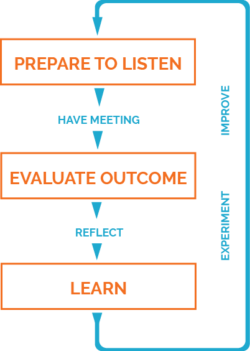PREPARE YOURSELF TO LISTEN
A SIMPLE PRACTISE THAT HAS A BIG IMPACT

LISTENING: A MANAGEMENT AND LEADERSHIP LEVER FOR YOUR SUCCESS
Listening is a fundamental building block for performance, collaboration, and efficiency of any organization, and any relation. In theory it is simple: You listen actively to what the other person is saying, with the intention to understand. If you do this well, it has positive impact on professional performance. However, more or less visible forces will distract you from listening well. Boredom, fear of intimacy, the cost of time, ego, bad habits, to mention a few. One major misconception that we often come across is that (good or great) listening is a skill. It is more useful, in our opinion, to consider it a practice, (that consists of behavior, actions, habits, methods and to some extent skills). This tool is therefore intended to help you adopt new practices in a simple and pragmatic way.
THIS IS HOW YOU CAN GET BETTER
Select specific meetings where you are going to practice and improve how you listen. It can be a performance review, or a regular 1:1 with an employee, a critical meeting for a project milestone, or any other meeting of importance and relevance. Take notes (see page 2 and 3) throughout the process and try to apply the principles of active listening.
PRACTISE: THE DIFFERENTCE BETWEEN KNOWING AND DOING
Principles of active listening:
- Focus Attention
- Watch Body language
- Read Emotions
- Observe And Tune In
- No Judgment
- No Interruptions
- Show That You Listen
- Re-Formulate What You Hear
- Ask Non-Directive Questions
- Do Not Offer Advice
- Allow For Silence
- Do Not Argue
- Show appreciation
Practise listening:

Start slowly, one practice round per week is enough. As you pick up the habit and get better at it, you may increase the frequency, as it will require less effort, until it becomes a natural habit. The following template is a draft to make it easy to start, and as you learn, you can adapt, elaborate, and make the tool yours, based on your needs, wants and ambitions.
template for listening practise
TAKE A FEW NOTES BEFORE AND AFTER A MEETING OF CHOICE
PREPARATION BEFORE THE MEETING (TAKE A FEW SIMPLE NOTES):
- What is my objective with the meeting?
- What will I do concretely/differently from usual in the meeting to make sure I listen well?
- Paying attention:
- Show that I listen:
- Asking questions:
- Sharing my point of view:
EVALUATION JUST AFTER THE MEETING (TAKE A FEW SIMPLE NOTES):
- What did I achieve in the meeting?
- What worked well and what did not in terms of listening?
- What did I learn by listening actively?
- How did the other person seem to feel?
- How did my questions add value?
- How was my feed back received?
LEARNING AND REFLECTIONS BETWEEN MEETINGS (TAKE A FEW SIMPLE NOTES):
- What am I the most satisfied with in this meeting?
- What am I the least satisfied with in this meeting?
- What questions comes to mind regarding listening?
- Why did things turn out the way they did in the conversation?
IMPROVING AND EXPERIMENTING (TAKE A FEW SIMPLE NOTES):
- What will I do differently in next meeting?
- What behavior or habit should I try to change for myself?
- What new approach / technique could I experiment with?
While it might feel counter-intuitive to go through the effort of writing down how you plan to listen to another person in a meeting, this is an exercise that will make you a better listener, and this in turn will allow you to achieve your objectives in meetings and conversations. Commit yourself to go through this cycle for at least 6 times to get an impact. You can also involve both the individuals you listen to, and your manager, or other resources in the exercise, to get an outside view on how (well) you are listening.
If you have any questions or comment, please contact us by phone or mail below.
